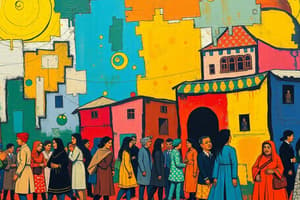Podcast
Questions and Answers
What is one way communities can preserve historical memory?
What is one way communities can preserve historical memory?
- Ignoring past events to focus on the future.
- Using oral tradition. (correct)
- Focusing solely on written records.
- Avoiding discussions about the past.
According to Andreu Espasa, what is historical memory?
According to Andreu Espasa, what is historical memory?
- Historical buildings.
- What a society collectively remembers and values. (correct)
- The perspective of political leaders.
- A collection of individual opinions.
Why is studying history important?
Why is studying history important?
- To memorize dates and names.
- To predict the future with certainty.
- To avoid change.
- To understand the past and interpret the present (correct)
What does historical memory include?
What does historical memory include?
What does Maurice Halbwachs argue that collective memory does?
What does Maurice Halbwachs argue that collective memory does?
How can communities revive past events to preserve memory?
How can communities revive past events to preserve memory?
What is the role of culture and traditions in historical memory?
What is the role of culture and traditions in historical memory?
What is one way that historical memory can be used?
What is one way that historical memory can be used?
What is one tool to preserve and evoke collective memory?
What is one tool to preserve and evoke collective memory?
What does Sánchez Jaramillo say history helps to make possible?
What does Sánchez Jaramillo say history helps to make possible?
Flashcards
Historical memory
Historical memory
A community's way of remembering and valuing past events, including feelings and perceptions.
Collective memory
Collective memory
Connects people to their past and ensures continuity with the present, seeing the past as a living part of daily experience.
The importance of studying history
The importance of studying history
It is not just about dates and events but about understanding why the world is as it is and how we got here.
Oral traditions in preserving memory
Oral traditions in preserving memory
Signup and view all the flashcards
Historical memory
Historical memory
Signup and view all the flashcards
Historical reenactments
Historical reenactments
Signup and view all the flashcards
Ecomuseums
Ecomuseums
Signup and view all the flashcards
Preserving historical memory
Preserving historical memory
Signup and view all the flashcards
Study Notes
- Historical memory is how a community remembers and values past events, encompassing not only written facts but also the feelings and perceptions influencing how events are recorded
- Celebrations and the way historical figures or events are valued are also included in historical memory
- History is a constantly changing discipline adapting to new questions and concerns
- Studying history is fundamental to understanding the past, interpreting the present, and anticipating the future
- According to Sánchez Jaramillo (2005), history enables understanding the present and implies finding the origins of the current state of affairs
- History is a tool for analyzing the world's current state and how humanity arrived here, aiding in addressing present and future challenges with clarity and knowledge
- Silvana Torres (2018), referencing Andreu Espasa, explains that historical memory is a society's collective recall, shared and valued by all in a community
- According to Espasa, historical memory can be used by politicians or groups to influence public opinion
- Hira de Gortari challenges critical reflection on the source of information and how ideas of the past are constructed
- These ideas align with Maurice Halbwachs (1950), who asserts that collective memory connects people to their past and ensures continuity with the present
- Halbwachs argues that historical memory sees the past as an active part of daily experience, with collective memory retaining what lives in the group's consciousness
- Historical memory can change based on who tells it and why
- Events like world wars or the 1968 student movement in Mexico can be recorded simply or in great detail, varying with personal or taught experiences
- Preserving historical memory, influenced by culture and traditions, is essential
- Indigenous communities remembering resistance against European invaders or Germany confronting the Third Reich's memory impacts societies
- To preserve historical memory, communities can use oral tradition by telling stories through generations
- Historical reenactments allow communities to relive past events
- Ecomuseums can be used to display artifacts and tell stories of the past
- Writing and reading about history helps maintain memory through books and documents
- Celebrating cultural heritage festivals allows for direct experience of a community's culture and history
- Creating art and memory murals serves as a tool to preserve and evoke collective memory
- These methods aid in remembering and feeling the past as part of one's identity
- Understanding the past is vital for present living, providing identity and teaching lessons
Studying That Suits You
Use AI to generate personalized quizzes and flashcards to suit your learning preferences.



